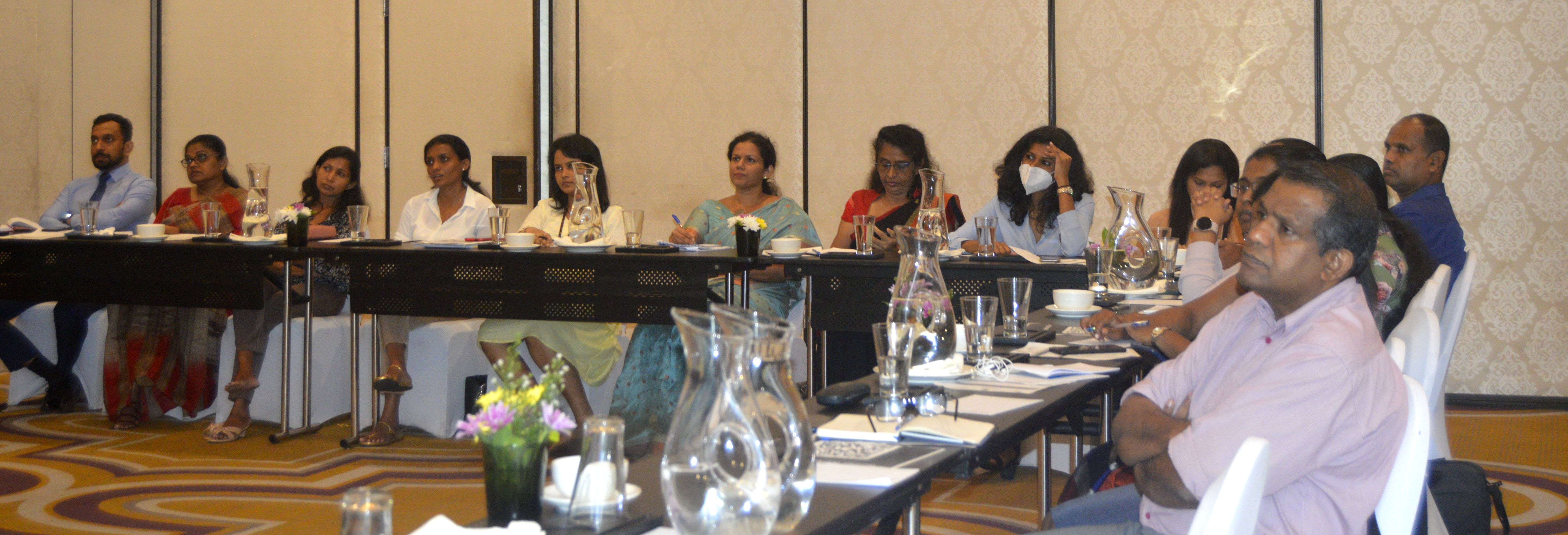The workshop aimed to provide a comprehensive understanding of gender policy development and mainstreaming and empowering participants to champion gender equality and effective policy integration. Fifteen participants, including representatives from the National Designated Authority (NDA), the Climate Change Secretariat of the Ministry of Environment, and potential DAEs, attended the workshop.
The participants were given an understanding of the key components that should be incorporated in a gender policy which facilitated the pipeline DAEs, particularly the bankers, to identify the gaps in the prevailing gender policies and to improve them accordingly. It also helped the participants to understand the significance of gender mainstreaming in projects funded by the Green Climate Fund (GCF) and provided them with the knowledge required to enhance gender mainstreaming in similar projects. The workshop enhanced the understanding of the participants on the importance of gender equity and its relation to climate change adaptation and mitigation. It is expected that the training would strengthen the monitoring and evaluation mechanisms that would further influence the effectiveness of gender integration in GCF projects.
After the inauguration session with the welcome address and opening remarks conducted by Dr R. D. S. Jayathunga, Additional Secretary (Environment Development) of the Ministry of Environment, Lal Induruwage, Regional Coordinator, GWP SAS and Anura Sathurusinghe, National Project Coordinator, 2nd NDA Readiness Project respectively, the participants were given a few minutes to get to know with each other with a brief introduction to themselves. The sessions started rolling out thereafter, and Dr Ramani Jayasundere, Director, Gender and Justice programmes from the Asia Foundation moderated the session on Developing a Gender-Inclusive Policy for potential DAEs. She discussed the need for a gender policy and the key components of a gender policy and explained ways to develop strategies to integrate gender equality into the policies and practices.
The Gender Equality and Social Inclusion (GESI) Expert of the 2nd Readiness Project, Amutharaj Amirthalingam moderated the sessions on Key Elements of Gender Analysis and Gender Mainstreaming in the GCF context, the impact of climate change on gender, developing a Gender-Inclusive Policy for the potential DAE and stakeholder engagement. He stated that the GCF encourages gender mainstreaming throughout the project phases to ensure impartial outcomes and to mitigate the impacts of climate change on marginalised. The impacts of climate change affect women and men differently due to pre-existing inequalities such as lack of access to resources and cultural norms. Therefore, it is key to integrate a Gender Policy and an Action Plan in individual GCF applications in order to promote gender inclusivity in climate financing. While prioritising gender balance and inclusivity in GCF projects, it is crucial also to ensure the engagement of stakeholders for project success and sustainability. Therefore, Amutharaj introduced methods of engaging stakeholders such as surveys, focus group discussions, public consultations, one-on-one meetings, workshops, and social media.
Senaka Jayasinghe, the former Assistant Vice President of DFCC Bank PLC, Sri Lanka participated in the workshop as a guest speaker to share his real-life experience during the journey of getting GCF accreditation. DFCC received the accreditation just a couple of months ago and Senaka highlighted the challenges they faced, and strategies undertaken to navigate the process successfully. To stimulate the real-life experience further, the participants were given three sample case studies and asked to identify the essential elements of a comprehensive gender policy for banks in groups. This final exercise has encouraged teamwork and resulted in highly interactive discussions and engagement among the participants.

The participants found the gender policy development workshop informative and educational. The dedicated gender policies are mostly missing in pipeline DAEs and through the workshop, they have learnt the necessary elements for a comprehensive and effective gender policy. The workshop also revealed the relation between climate change and gender and the concept of gender mainstreaming. The participants ensured that the workshop was a great success, and they gained valuable insights for developing their own gender policies and continuing the GCF accreditation process successfully.
